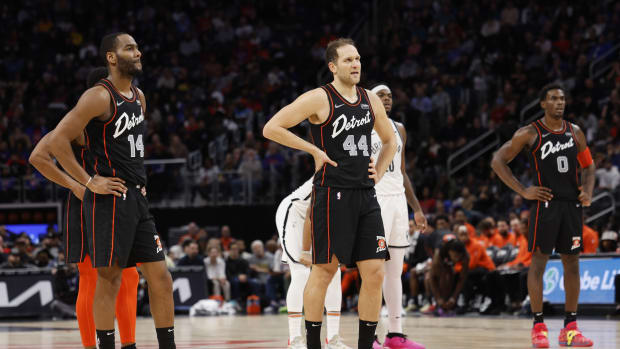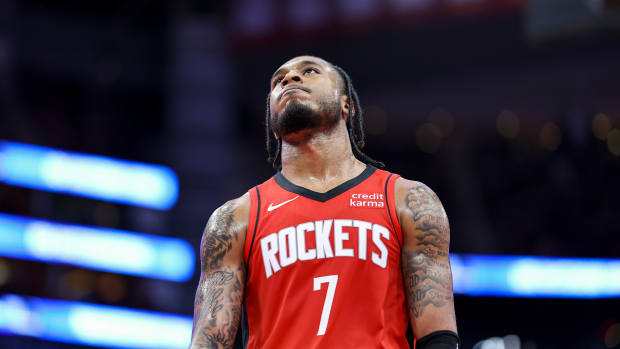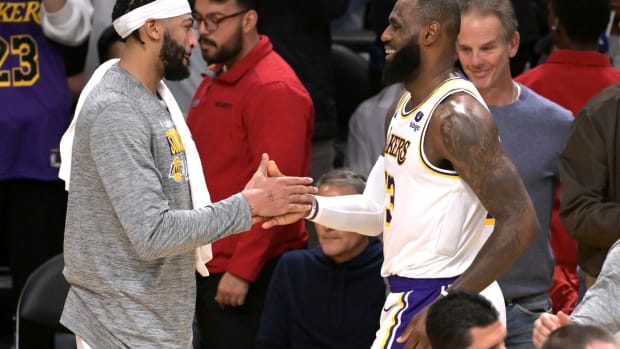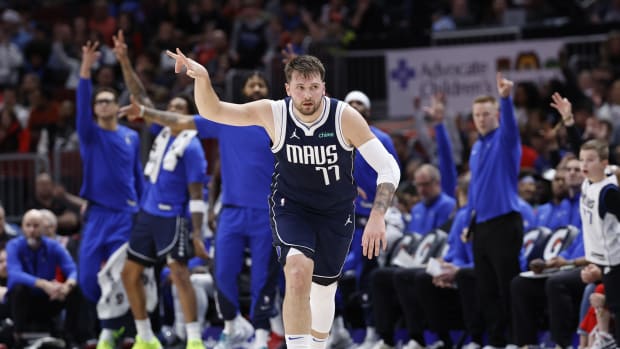Russell Westbrook's Spat With Jazz Fan Shane Keisel Puts Spotlight on Adam Silver, NBA Office
A high-profile incident involving Oklahoma City Thunder guard Russell Westbrook and a heckling fan highlights the sometimes overly-close physical proximity between NBA fans and the targets of their derision. As explained below, the NBA could view the incident as damaging to the league brand and thus potentially warranting varying kinds of punishments.
On Monday night, Westbrook and 45-year-old Shane Kiesel exchanged insults during the second quarter of the Thunder’s game with the Jazz in Vivint Smart Home Arena. Only a portion of the incident was caught on video, and that portion is damning of Westbrook. He is shown telling a nearby arena attendant “I’ll f--- him up” in apparent reference to Kiesel. Westbrook then turns to directly confront Kiesel, who was not in Westbrook’s immediate vicinity but was close enough for Westbrook to visually target. “I promise you,” Westbrook warned Kiesel. “You think I’m playing? I swear to God, I swear to God, I’ll f--- you up. You and your wife, I’ll f--- you up.”
Westbrook and Kiesel, who ESPN reports was seated next to his wife, Jennifer Huff, in the third row near the Thunder’s bench, have offered dramatically different accounts of what precipitated this exchange. For now, there is no other video, meaning we are reliant on witness accounts and the believability of their recollections.
Westbrook insists that Kiesel started it. Kiesel, according to Westbrook, told him to “get down on your knees like you’re used to.” Westbrook interpreted this alleged statement as a degrading and possibly racist remark. Westbrook explained after the game that Kiesel’s insult is the latest in a series of disdainful remarks by fans aimed at him and other NBA players when playing in road arenas. “I just think there's got to be something done,” Westbrook told ESPN. “There's got to be some consequences for those type of people that come to the game just to say and do whatever they want to say. I don't think it's fair to the players—not just to me, but I don't think it's fair to the players.”
Corroborating Westbrook’s account is teammate Patrick Patterson. “Fans can say s--- about a man’s family, wife, & kids,” Patterson tweeted. “Tell a player ‘Get down on your knees like your use to.’ As men, what do you expect us to do? Shut up & dribble? No one is held accountable for their actions except for us. Fans are protected in every way possible but not us.”
Kiesel has been publicly critical of Westbrook in the past. He has even gone so far as to say that Westbrook should have his “ass” kicked. Last year, Kiesel tweeted, “Westbrook is a piece of classless s---. Somebody needs to kick his ass. #tool #poorloser.” According to BET, Kiesel has also tweeted racist comments (Kiesel denies he made these purported tweets).
For his part, Kiesel insists that he was innocently poking fun at Westbrook during Monday’s game. Kiesel also contends that Westbrook became oddly menacing in response to Kiesel’s jeering, which Kiesel stresses involved no obscenities or other curse words. To that end, Kiesel recalls that he jokingly told Westbrook to “ice those knees up”, which Kiesel says led Westbrook to reply he was placing heat on his knees. Kiesel asserts that Westbrook then became belligerent and “went nuts.”
Kiesel expresses outrage that Westbrook would threaten his wife—"no man,” Kiesel says, “should threaten a woman, period.” He also mocks the 6’3, 200-pound Westbrook as a “big man” for terrorizing “a woman that’s 5 feet tall and 110 pounds.”
Even if Kiesel’s account of Monday night is accurate, Kiesel’s behavior was not innocent in the eyes of the Jazz. First, Kiesel and several other fans in Vivint Smart Home Arena were issued co-called “warning cards” pursuant to the NBA’s Fan Code of Conduct. The 274-word code instructs that fans who engage in disruptive behavior can be forced to leave the arena without a refund. Kiesel and other fans were admonished that if they continued to engage in “verbal abuse” they would be kicked out. Second, on Tuesday, the Jazz permanently banned Kiesel from any events held in the Vivint Smart Home Arena. In a statement, team president Steve Starks explained that the Jazz “will not tolerate fans who act inappropriately” and that “there is no place in our game for personal attacks or disrespect.”
NBA fallout for Westbrook
The NBA has punished Westbrook by fining him $25,000 for inappropriate language, while Kiesel and Huff could conceivably sue Westbrook. Meanwhile, as explained below, the Jazz have banned Kiesel from future games and other events at the Vivint Smart Home Arena.
Taking the NBA’s response first, the league had reason to punish Westbrook. This is true even if Westbrook’s self-forgiving account of the incident proves entirely accurate. The reason: regardless of what a heckler says to an NBA player, that player can’t threaten the fan with physical violence nor can he yell obscenities at the fan.
There are several sources of authority to support that proposition.
First, the aforementioned Fan Code of Conduct guarantees ticketholders that “players will respect and appreciate each and every fan.” It also guarantees that ticketholders will be treated “in a consistent, professional and courteous manner” by everyone who works for teams and the arena. Likewise, ticketholders are assured they will enjoy games “free from disruptive behavior, including foul or abusive language or obscene gestures.”
Clearly, Westbrook violated these provisions. His threatening of violence and use of obscenities were completely inappropriate. Even if you believe that Kiesel “deserved” what Westbrook yelled at him, Westbrook can’t utter those remarks in a packed NBA arena. Fans, including children, may have heard what he said. Westbrook also threatened violence against Huff, who does not appear to have played any role in her husband’s exchange with Westbrook.
Since 2004, the NBA has been particularly sensitive to the topic of hostility between fans and players. Back then, Indiana Pacers forward Ron Artest lost his temper when he was hit by a plastic cup of Diet Coke thrown at him by Detroit Pistons season-ticket holder John Green. Artest rushed up to the stands and attacked the wrong person. The incident triggered the infamous melee at Auburn Hills, with fans and players swinging punches at each other and fans throwing objects at Pacers. It was total chaos and led the NBA to revisit its arena security protocols.
The “Malice at the Palace” also was problematic for the NBA in terms of league image. The league markets itself as a fan-friendly environment where parents can take their children to games and be assured of a safe and comfortable experience. This is important for drawing American fans and also attracting an international audience. The NBA also has lucrative sponsorship deals with businesses that value their association with the league. If the league becomes identified with players who swear at fans and threaten violence against women, the league will experience a far a more difficult time negotiating sponsorship deals. Given that NBA players receive between 49% and 51% of basketball-related income or “BRI” (a collectively bargained term that refers to revenue generated by apparel contracts, as well as revenue generated by NBA broadcasts, arena signage and other properties), players have a clear financial stake in maximizing the marketability of games.
In addition to the Fan Code of Conduct, the uniform player contract signed by every NBA player contains provisions that empower commissioner Adam Silver to punish Westbrook. For instance, paragraph 5 establishes policies for player conduct. It instructs that a player must “conduct himself on and off the court according to the highest standards of honesty, citizenship, and Sportsmanship” and “not to do anything that is materially detrimental or materially prejudicial to the best interests of the Team or the League.” Obviously, a player swearing at a fan and threatening to “f— up” both the fan and his wife violate this provision.
In addition, players are contractually bound to follow Article 35 of the league’s constitution. Article 35 empowers Silver to suspend or fine a player who makes statements that have “an effect prejudicial or detrimental to the best interests” of the league. Article 35 also authorizes punishments for a player who is “guilty” of conduct that does not “conform to standards of morality or fair play” or is guilty of other types of conduct deemed “detrimental” to the NBA. Westbrook’s comments clearly run afoul of these contractual obligations.
Silver and NBA executive VP of basketball operations Kiki VanDeWeghe also have a track record of fining players for inappropriate exchanges with fans. For example, last November the league fined Golden State Warriors star Kevin Durant $25,000 after Durant told a heckling Dallas Mavericks fan “Watch the f------ game and shut the f--- up.” In October 2017, the NBA fined Boston Celtics guard Kyrie Irving $25,000 for responding by saying “suck my d---” to a Philadelphia 76ers fan who had asked him, “Kyrie, where's LeBron?"
The NBA could view Westbrook’s comments in a worse light than those by Durant or Irving.
First, Westbrook’s choice of words conveyed a threat of violence. His threat was to “f--- up” two people. Neither Durant nor Irving threatened violence.
Second, Westbrook aimed his threat at not only Kiesel but also his wife, Huff, who does not appear to have done anything to warrant such a remark.
Third, the 30-year-old Westbrook is in his 11th NBA season and is sufficiently experienced to know better. The NBA didn’t punish him last year when he “shoved” a Denver Nuggets fan who went on the court, and so the league might reason that he’s already gotten a break. Westbrook is also not a first-time offender when it comes to incidents while playing in the Vivint Smart Home Arena. In last year’s playoffs, Westbrook slapped a phone out of a fan’s hands. He later said, “I don’t confront fans. Fans confront me. Here in Utah, a lot of disrespectful, vulgar things are said to the players here.” The NBA could reason that, given his past interactions with Jazz fans, Westbrook should make a greater effort to avoid hostile interactions with them.
On the other hand, the NBA weighed mitigating factors. Westbrook contends Kiesel directed a racially-insensitive remark at him and, by extension, his family. Such a remark would understandably have angered Westbrook. Although Jazz president Steve Starks’ statement in explaining the ban of Kiesel doesn’t claim that Kiesel made a racist comment, it does say that he partook in “derogatory verbal abuse.”
Second, while Westbrook threatened to “f--- up” Kiesel and Huff, the notice may have been more for theatrics than an admonition of actual danger. Indeed, common sense suggests that Westbrook, who by all accounts is a law-abiding citizen, would not carry out such a threat against a random guy who momentarily upset him and who Westbrook might never see again. Along those lines, Westbrook didn’t follow up his threat with any aggressive move nor did he try to physically confront Kiesel. To that point, one might question whether Westbrook would have uttered the same remark to Kiesel if he was standing right in front of him.
The NBA could have also taken into consideration that Westbrook has been a target of unwanted fan interactions and has, in some instances, handled these matters with grace. As SI’s Rohan Nadkarni explained, Westbrook “deftly” managed a young fan reaching out and poking him while he played in Denver. Westbrook diffused the situation.
The NBA could have fined Westbrook a maximum amount of $50,000 under NBA rules. Alternatively, the league could have suspended Westbrook. Had he been suspended, Westbrook would have had no right to appeal it to independent arbitration unless the suspension totaled 13 or more games. However, under Section 9 of Article XXXI of the CBA, a player who is suspended for 13 or more games may petition a neutral grievance arbitrator for the appeal.
The fact that Westbrook was fined and not suspended is consistent with past practices. Keep in mind that, under Silver’s leadership of the NBA, the longest non-drug/non-domestic violence player suspension has been eight games. This was the punishment imposed by the Chicago Bulls on Bobby Portis after he scuffled with teammate Nikola Mirotic during a practice in 2017. The league has not suspended players for comments directed at fans.
Potential legal fallout Kiesel, Huff sue Westbrook
After the game, Kiesel seemed enraged that Westbrook pledged to “f--- up" Huff. It’s possible that Kiesel and/or Huff could explore the possibility of suing Westbrook.
There are at least a few potential legal claims. One would be for assault, which does not involve any physical contact. Instead, assault refers to threatening to inflict injury on another person with an apparent ability to do so and causing that person reasonable apprehension of imminent harm.
It is unlikely that assault would serve a viable claim since Westbrook did not intend to immediately hurt either Kiesel or Huff (one could also argue, as noted above, that there was no threat of violence whatsoever, and that Westbrook’s comments were merely a combination of theatrics and machismo). Kiesel has also not stated that he believed Westbrook would harm him or Huff.
Intentional infliction of emotional distress would be a more plausible claim. It refers to using extreme and outrageous conduct to cause another person severe mental suffering and anguish. An NBA player threatening to “f--- up" fans during a game is arguably extreme and outrageous. It is certainly uncommon behavior and the kind of behavior that, as explained above, NBA rules and policies clearly prohibit.
Less clear is whether Kiesel or Huff suffered the requisite distress. Kiesel was clearly angered after the game and presumably Huff was also displeased. Kiesel has also become a limited public figure by virtue of the incident. He is now associated to Westbrook in a way that is probably unwanted, and that the Internet will ensure is permanent. Still, both Kiesel and Huff are grown adults. They’ll probably get over the exchange with Westbrook in the near future and move on with their lives. Then again, now that Kiesel has been permanently banned from Jazz games, he may be more motivated to take decisive action.
Still another possible claim would be for defamation. Westbrook claims that Kiesel yelled “get down on your knees like you’re used to!”. Kiesel appears to deny it. Kiesel could argue that Westbrook has falsely attributed a statement to Kiesel that, through the Jazz ban of Kiesel, has already caused him harm. One hurdle for Kiesel is that he is probably a limited public figure (someone who isn’t generally famous but who becomes noteworthy for a specific matter or controversy) If so, Kiesel would need to prove “actual malice.” In this context, actual malice would mean proving that Westbrook either knowingly stated false and defaming information about Kiesel or had reckless disregard for the information’s truth or falsity. Kiesel would need to prove more than Westbrook simply being mistaken about what Kiesel said.
A lawsuit would also bring about the risks of pretrial discovery. If Kiesel has made any inappropriate or insensitive comments about Westbrook or other players, those comments could surface in the litigation.
In addition, Westbrook could conceivably countersue Kiesel for inflicting emotional distress on him. That serves as another reason for Kiesel to not bring a case.
Fallout for Kiesel
After investigating the confrontation between Kiesel and Westbrook, Jazz executives have concluded that Kiesel’s behavior constituted excessive and derogatory verbal abuse and thus warrants a ban. It’s clear that Kiesel’s conduct has caused the franchise embarrassment. The NBA might also insist that Kiesel has caused strained the league relations with players who feel as if the league isn’t doing enough to protect them from unruly fans. It’s thus not surprising that Jazz executives have decided that they don’t want Kiesel in their arena—whether it be for Jazz games, NCAA tournament games or music concerts.
A facility ban is a lawful type of sanction by a privately-owned arena.
Tickets to NBA games may come in the form of paper tickets or digital files. More importantly, tickets represent a revocable license to enter an arena for a specific game. While in the arena, fans are contractually required—per the ticket—to adhere to both NBA and local venue rules for fan conduct. The Jazz play in the Vivint Smart Home Arena, which is owned by the Miller family (who also own the Jazz). The arena incorporates the NBA’s fan code of conduct into its own conduct rules. This means that fans are legally required to be respectful and refrain from disruptive conduct. In other words, no person has an intrinsic “legal right” to buy a ticket to an NBA game. Someone who engages in disruptive conduct can be refused a sale.
The Jazz have decided that Kiesel violated contractual terms in such a way as to justify being barred from the premises. This means that the team will refuse to sell Kiesel a license to enter the facility. If Kiesel, who has been on TV over the last day, nonetheless entered the facility, he would be a trespasser—even with a ticket. He would then become subject to arrest for trespass and disturbing the peace.
You might wonder how the Jazz can realistically enforce a ticket ban. Vivint Smart Home Arena seats more than 18,000 people. Perhaps Kiesel, who appears to be of ordinary size, might be able to enter with someone else’s ticket and then blend in with the crowd. This would seem even more possible as Kiesel ages and his appearance changes. In truth, there are limits to facilities’ capacity to enforce bans. Surveillance cameras and facial recognition software can help, provided they are being actively engaged. Flagging whichever credit card Kiesel used to buy his seats (provided he bought them) could also prove helpful, though less helpful if Kiesel tries to buy a ticket from a third-party vendor. Still, the real deterrent is the knowledge that if Kiesel tests the ban and is caught, he could be arrested.
Kiesel isn’t the first NBA fan banned from attending home games. John Green, as discussed above, is banned from attending Pistons home games. Also, former Los Angeles Clippers owner Donald Sterling is banned from attending any NBA games or practices pursuant to his lifetime ban from the league.
The NBA and player security
The Westbrook-Kiesel confrontation will have a fallout for both Westbrook and Kiesel, but arguably a more significant issue for the NBA is whether fans’ proximity to players warrants greater security.
Westbrook called for more sideline protection after the young fan poked him in Denver. Other players have been touched by fans, even though fans are prohibited from doing so. In 2016, a fan seated in the second row reached out and grossly touched Mozgov's Cavaliers shorts over his butt. Fans have also made unwanted physical contact with LeBron James and Ramon Sessions, among others, in recent years. Even fan incidents without player physical contact can, as shown in the Westbrook-Kiesel confrontation, lead to undesired controversies.
An imperfect and controversial “fix” would be to eliminate floor and perhaps an additional row or two of seating so that there is more physical space between the court and fans. This approach would also mean the elimination of some of the best and most expensive tickets in the house. The TV visual of the game would also change, with players being more physically removed from fans.
It’s also worth noting that while there have been instances of fans touching players and player-fan arguments, most games are played without incident. In fact, while there is not data on this, the chances of such an incident occurring in any one game are probably very low.
The Crossover will keep you updated on the fallout of the Westbrook situation.
Michael McCann is SI’s legal analyst. He is also Associate Dean of the University of New Hampshire School of Law and editor and co-author of The Oxford Handbook of American Sports Law and Court Justice: The Inside Story of My Battle Against the NCAA.



































